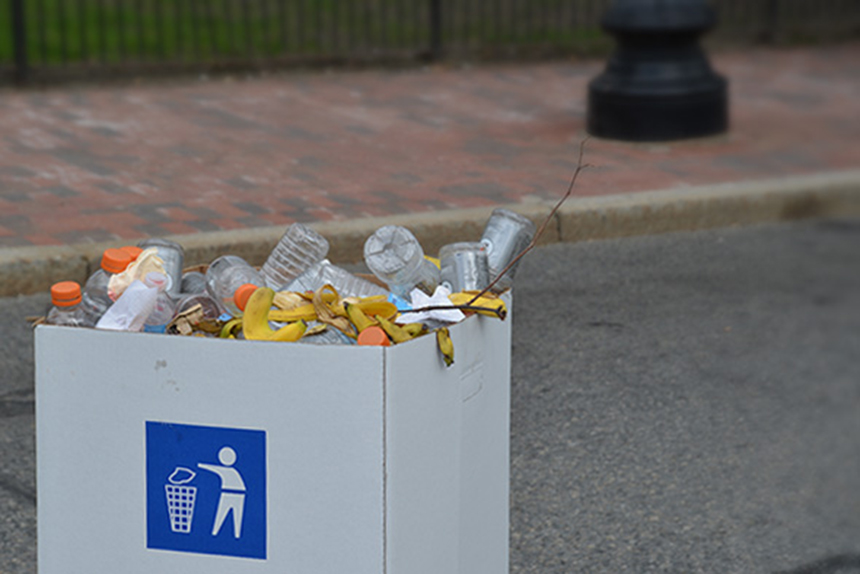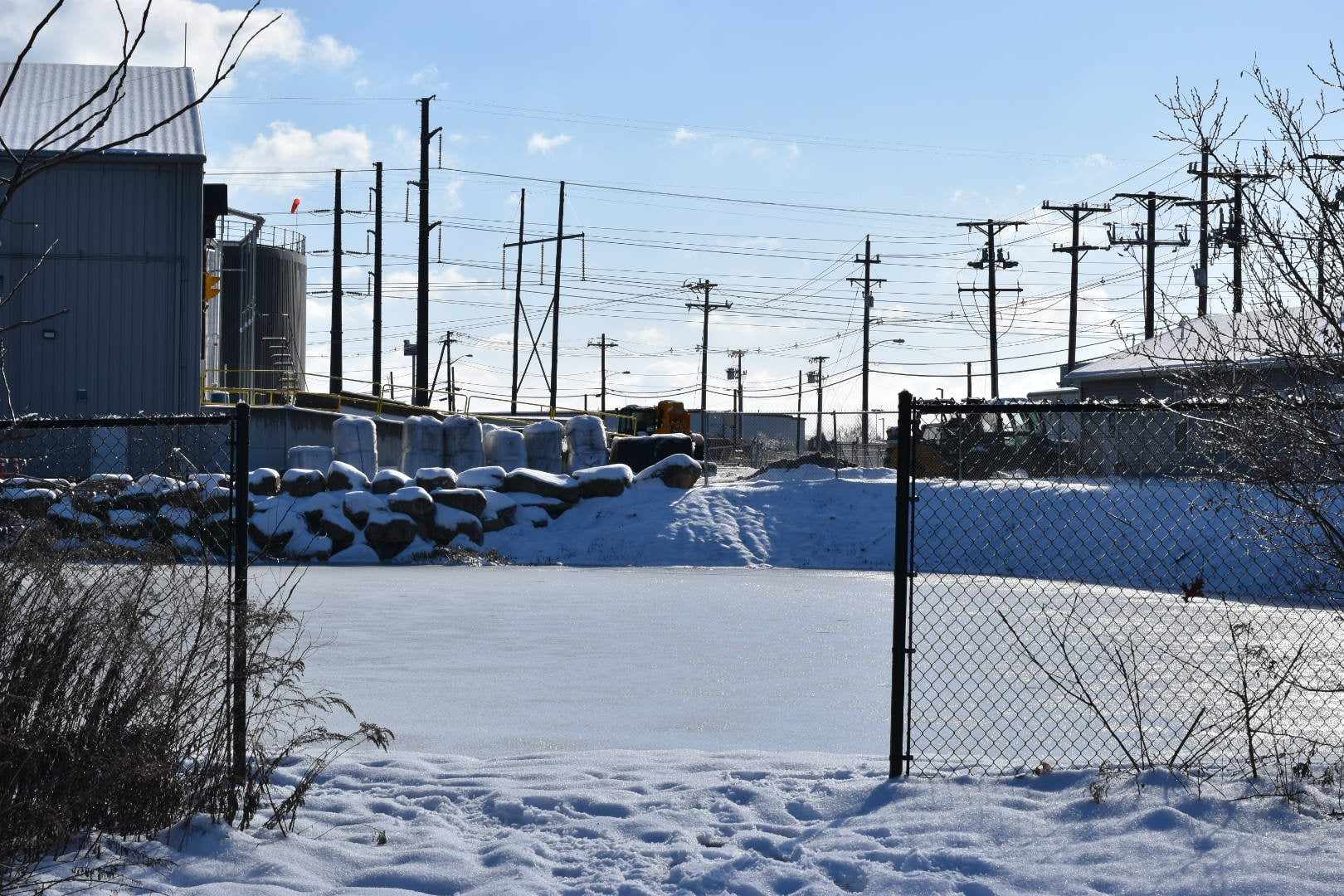Providence Events Can Be Trashy
August 19, 2012
This summer, the Rock ‘n’ Roll road race series made stops in Providence, Chicago and Seattle, among 24 other cities, and ecoRI News decided to see how recycling and composting for this nationwide tour were handled by a city on the West Coast, in the Midwest and on the East Coast. This coverage provides a small snapshot of the nation’s recycling and composting requirements when it comes to a for-profit business bringing a large waste-producing event to town.
ecoRI Public Works was hired last summer to help handle the sorting of recyclables, food scrap and trash during the 2011 Providence Rock ‘n’ Roll Half-Marathon. Both staffers and volunteers were appalled by the amount of waste the event produced.
At last year’s race, ecoRI Public Works set up dozens of three-receptacle stations, with each bin clearly marked for trash, recyclables or food scrap. These signs were often ignored.
This year, our services weren’t requested nor offered, and the 2012 event didn’t include the sorting of recyclables or food scrap. A few of the people on the clean-up crew who were moving trash bags to the Gaspee Street curb Sunday morning told ecoRI News that the material in the light blue trash bags would be recycled. On closer inspection, this seemed highly unlikely, since recyclable plastic bottles and aluminum cans were mixed together with orange peels, Styrofoam cups, wooden popsicle sticks and white runners’ towels.
Wasteful practices
Officials in both Providence and Chicago have failed to put practices in place that require event organizers to follow the same recycling mandates placed upon city residents. And forget about collecting event food scrap and keeping it out of landfill-bound Dumpsters.
Need proof? Look at how the enormous amount of waste generated at the recent Rock ‘n’ Roll races held in the three cities was handled. Neither Providence nor Chicago required the race organizer, Competitor Group Inc., to separate recyclables from the trash. It was single-stream all the way to a landfill.
In Seattle — and throughout the state of Washington, in fact — beverage vendors at events are required by law to provide recycling for single-use plastic, glass and aluminum containers.
Both the start and finish for the June 23 Half-Marathon and Marathon were at Seattle Center, a sports/event facility known locally for its cleanliness, well-managed maintenance crews, and commitment to recycling and composting.
“A recycling ethic is imbedded here in Seattle,” said Mary Wideman-Williams, chief operating officer for Seattle Center. “It’s the benefit of being in a progressive recycling community.”
Providence and Chicago may want to be progressive, but neither is.
Landfill capacity at both the Central Landfill in Johnston and in northeastern Illinois is quickly vanishing, and officials both here and in Chicago have so far attempted to solve this problem by focusing on residential recycling while ignoring the business sector.
The Illinois Environmental Protection Agency has estimated that there are only five years of landfill capacity left in that region of the state. When it’s gone, Chicago-area waste will need to be hauled further and further away to be buried.
Here, the Central Landfill has about 23 years left, according to the Rhode Island Resource Recovery Corporation (RIRRC), which recently spent nearly $17 million on new recycling equipment. It is hoped that the new statewide single-bin recycling program dubbed “Recycle Together RI” will increase the Ocean State’s floundering recycling rate.
It may, but without a serious commitment to keep event and business sector recyclables from being trashed and without a comprehensive statewide composting plan, does it really matter? Most of Rhode Island’s public school systems don’t even recycle. If the state can’t teach our students the proper way to dispose of materials, how does it expect to solve this very real problem?
Both the Seattle and Chicago Rock ‘n’ Roll races were inundated with Styrofoam cups courtesy of vendor Jamba Juice. Providence was spared. (Erika Johnson/ecoRI News)Waste challenged
Rhode Island, and the state’s urban core more specifically, have been slow to embrace a big-picture view of recycling and waste reduction.
In Providence, for example, officials, in an effort to improve the city’s stagnant recycling rate of 15.9 percent, recently challenged residents to do better. The six-week contest called the Neighborhood Recycling Challenge began July 30. It doesn’t, however, challenge businesses or event organizers to, as the Office of Sustainability website says, save the city money and help protect the environment.
On Sunday, Aug. 19, the park between Providence Place Mall and the downtown train station was bustling with activity and dotted with white cardboard trash bins lined with black, light blue or clear plastic bags. There was no signage calling for recyclables to be put in this bin or trash in that one.
Recyclable aluminum cans and plastic water, sports drink and chocolate milk bottles shared these bags with wet runners’ towels, popsicle boxes, plastic wrapping and compostable banana peels. These different colored bags were then tossed together into a Dumpster.
Monday morning, commuters headed to the train station, Providence Place Mall or the Statehouse were greeted by a park littered with empty cardboard boxes, 12-ounce aluminum beer cans, assorted sizes of plastic bottles, a tattered cardboard box overflowing with clothes hangers, untied bags of trash, a pallet of broken-down cardboard boxes, three Chipotle veggie burritos wrapped in aluminum foil and a box of flattened plastic water bottles that, even if they were destined to be recycled, wouldn’t be, because the RIRRC’s new sorting machine considers flat items to be paper.
A crate of perfectly edible oranges and a 12-pack of unopened bottled water sat in a Dumpster, and a failed composting project in a far corner of the train station lawn featured bacon, salad greens, buns, brownies and home fries either left on the ground or left in an aluminum tray that was left on the ground.
Providence has no requirements for recycling or composting at outdoor events, even for regular happenings such as WaterFire. The San Diego-based company that organized Sunday’s road race wasn’t required to recycle or compost. Sheila Dormody, the city’s first director of sustainability, said both are on her long list of environmental objectives.
At the moment, though, any effort to collect food scrap, and plastic water bottles, cardboard and other recyclables at such events is strictly voluntary, said Dormody, who has been on the job for less than a year.
The RIRRC offers recycling bins and recycling Dumpsters at no cost, including delivery, for large waste-intensive public events, such as for-profit road races. Yet, according to Providence’s Environmental Sustainability Task Force, it would prefer that event organizers comply with recycling laws — the ones residents have been challenged to better obey — voluntarily.
Amelia Rose, chairwoman of the Environmental Sustainability Task Force, believes some sort of guidelines for recycling and food-scrap collection are needed. “It’s something the city wants to do,” she said. “I think it’s very important.”
It’s also the right thing to do, and requiring event organizers to recycle and collect food scrap won’t spoil the fun. The Providence Rock ‘n’ Roll Half-Marathon, for instance, would still be an enjoyable, inspiring and profitable event even if Competitive Group was forced to recycle and collect food scrap. In fact, at least a few of the 5,000 or so runners asked clean-up crew members if there was a bin for recyclables.
Waste option
In Chicago, event organizers also have the option of whether they want to be bothered with separating recyclables from the waste headed to dwindling landfill space in northeastern Illinois. The Windy City does, however, allow residents to compost in their own backyards — provided “these compost operations are well managed” and can pass a moisture-level inspection called the “squeeze test.”
If an investigation of a Chicago backyard compost pile is warranted, a sample of the compost will be collected and hand-squeezed. “If water drips or trickles from the squeezed sample, but does not drip from the sample without squeezing, and the sample maintains its shape upon release, the moisture level is within” allowable limits, 40 percent to 60 percent.
No city official was on hand during the July 22 Chicago Rock ‘n’ Roll Half-Marathon hand-squeezing the event’s compostable food scrap that was being tossed out with recyclables.
As the Chicago event wore on, and more and more of the 20,000 runners crossed the finish line, participants loaded up on Chobani yogurt and chocolate milk. By 10 a.m., the trash receptacles on every street corner in the vicinity of the race were overflowing with banana peels, plastic water bottles and Styrofoam cups. Nothing was being separated, and the clean-up crew was having trouble keeping up with the high volume of waste.
Crews worked long after the race and after-party had ended, picking up the lingering mess left behind by others. Unfortunately, all of it ended up buried in northeastern Illinois.
“One of the easiest things we can all do to improve our environment is to recycle wastes whenever possible. Recycling saves natural resources and energy and reduces the need for landfills or incinerators,” according to the Illinois Environmental Protection Agency website.
Like Rhode Island, that responsibility is expected of residents only.
Setting an example
Commonsense environmental practices, which recycling and food-scrap collection certainly are, can be part of a road race, festival or concert without taking away from the event’s enjoyment or experience. It just takes some initiative, some forward-thinking laws and a will to make such practices part of a community’s culture.
Just look to the Pacific Northwest for some inspiration. In Seattle, where the June 23 Rock ‘n’ Roll race drew more than 22,000 runners and featured both a half-marathon and a full-marathon, the environment wasn’t sacrificed for the sake of an event.
Recyclables, such as numerous plastic water and sports drink bottles, and compostable cups were kept out of Washington’s waste stream, and, according to ecoRI News’ Seattle correspondent, there was an overall lack of litter throughout Seattle Center before, during and after the event. The same can’t be said for downtown Providence following its hosting of the event.
For the event, Seattle Center brought in more staff and added extra waste, recycling and compost bins. In the center’s lawn areas and open spaces, there were three receptacles every 30 feet — each triad had separate waste, recycling and compost bins, all marked with signage — and large Dumpsters, for waste and recycling, every block.
But even the Emerald City fails to make food-scrap collection mandatory during events, although Seattle residents can place food scraps and food-soiled paper in their city-provided food and yard waste cart that is emptied curbside.
And Seattle — like Rhode Island with businesses that ignore the state’s recycling laws — is guilty of inadequately enforcing recycling and composting mandates.
Since July 2010, Seattle law has required food-service businesses, including food and beverage vendors at events, to use compostable or recyclable food packaging in place of disposables such as expanded polystyrene, better known as Styrofoam.
Despite that law, which carries with it a $250 fine for each violation, Styrofoam Jamba Juice cups littered Seattle Center and the surrounding area June 23.
“Encouraging recycling and compostables collection at your event is not only good for the environment but also saves you money through lower garbage disposal costs,” according to the Seattle Public Utilities website. “Recycling and compostables collection saves money on landfill costs and cuts down on energy and greenhouse gas use in manufacturing.”
Recycling and composting food scrap do all that and more, but these initiatives don’t work unless programs are put in place and laws enforced.
Erika Johnson from Chicago and Greta Wilson from Seattle contributed to this report. ecoRI News staffers Tim Faulkner and Joanna Detz also contributed to this report.




While RocknRoll Marathon could certainly do something to help make recycling easier, to lay the blame at their feet is certainly unfair. The real issue is the City and the State failing to create an environment that includes the public's participation. While many in the public are conscientious enough about the environment to recycle, you point out yourself that even last year when you tried to recycle, many people ignored the signs and cross contaminated the recyclables. How is that the marathon's fault.
The City is a huge violator itself. It collects recyclables in its city offices and city hall, then mixes them all together to dispose in the trash. At other events throughout the city it becomes unaffordable because one city department has the recycle bins, but because of the unions, they can only drop them off at the edge of a park, then another city department has to take them into the park. So twice as many union works get paid four hours minimum of overtime, for a half hour job.
The story didn't lay the blame on any event organizer. The entire point of the story was the need for cities and states to take the issue more seriously and put enforceable rules and regulations in place, and to show how three different cities handled the same event. But businesses should also take it upon themselves to do a better job, which Competitive Group did this year compared to last.
I agree the laws need to be improved and enforcement upped…but the big problem around here is the "recycling mentality" isn't widespread. When I walk around my neighborhood, I see recycling bins chocked full of non-recyclable materials…Styrofoam cups and packing materials, for example.
Of course, around here, getting someone to throw trash in a bin (even the wrong bin) is a minor victory. It seems many just throw it on the ground.
I live in Warwick…the other day I dropped my car off at the mechanic, and walked the1/4 mile to my house. I happened to have a plastic shopping bag with me, so as I walked back, I picked up trash off the roadside, focusing exclusively on recyclable items.
When I got to my house (again, 1/4 mile or less from the garage), I emptied a VERY full bag into my recycling bin. I was glad to make a small dent in the mess, but it was kind of depressing, really.
Thanks for highlighting this issue. In Newport, the Newport energy and environment commission and clean water action are working with DEM, city leaders, community partners
and event organizers to implement sustainable protocols for our city's many events. It is a big job and will take some time and effort, but as you can see from your video and article, we must move in this direction.
Road Races, such as the Rock ‘n’ Roll marathon mentioned in this article, can produce significant amounts of waste. At the same time, races can have a positive environment by committing themselves to environmentally conscious and sustainable practices. As stated, many race attendees have ignored waste disposal signs in the past, but individuals are more likely to properly dispose of their waste if they support the event’s goal to produce minimal waste and protect the environment. Therefore it is event organizers’ and advertisers’ responsibility to put forth a clear message, that the race aspires all attendees to minimize their waste, properly dispose of it, and be kind to the environment.
In addition, road races could decrease their ecological footprint by advertising exclusively through electronic web pages and social media, selecting biodegradable or recycle materials for items like t-shirts, medals, and food service ware, and choosing to incorporate local services, organizations, and public transportation options in order to decrease carbon emissions. Larger road races like the Rock ‘n’ Roll marathon may be too large to solely rely on local services and can choose to become certified by the "Council for Responsible Support". This certification program helps the event increase their sustainable efforts and then verifies those efforts publicly so that participants and sponsors understand they are supporting an environmentally conscious event. Road race organizations must decide whether they want to harm or help the environment when planning and hosting such races.